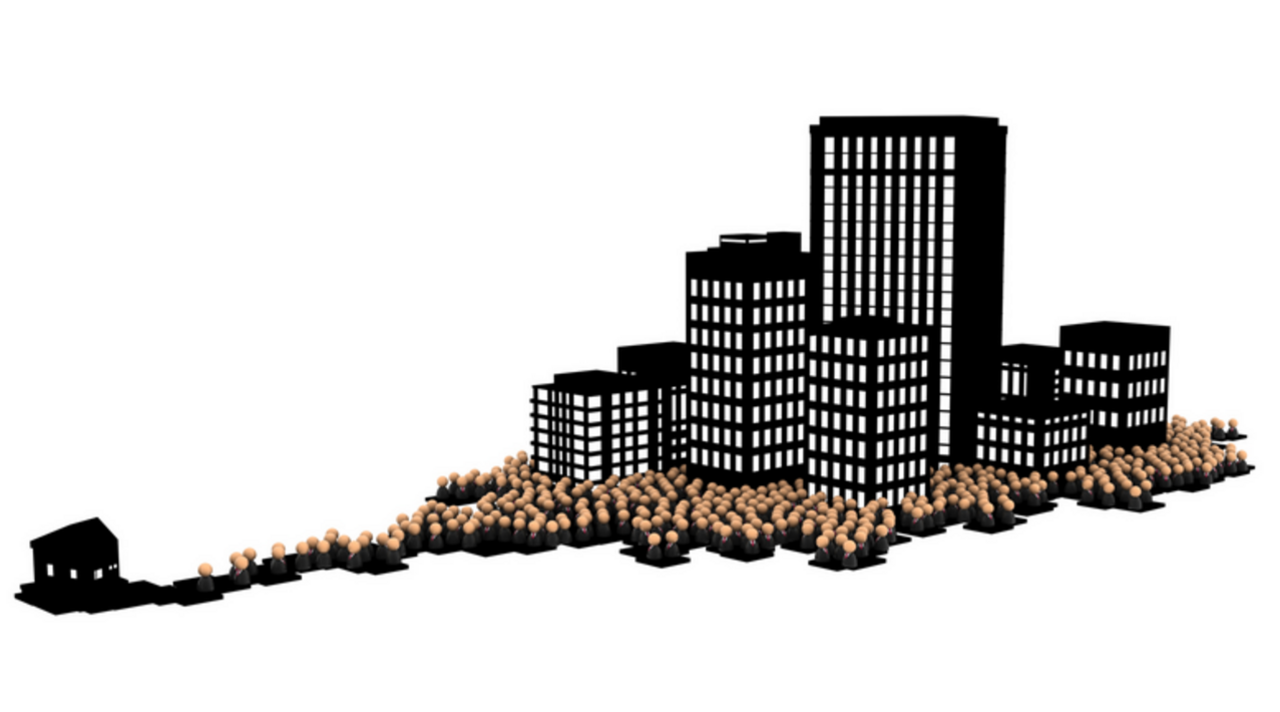Project
The spatial mobility of workers over the course of their working lives – Analyses for rural areas in Germany

The local availability of human capital is of high importance for the economic development of rural areas. In particular in times of demographic change, the spatial mobility of labour is a crucial determinant of the human capital endowment of a region.
Background and Objective
In Germany, significant regional disparities have existed for a long time w.r.t. economic strength and labour market conditions. The mobility of labour is of high importance for the economic development of rural areas and regional disparities.
Therefore, this project analyses migration balances of rural areas in Germany and the determinants of interregional labour mobility. In particular, it focuses on the spatial mobility of workers over their individual working lives, i.e., the likelihood to emigrate from a rural area, to immigrate to a rural area, and subsequent return migration.
Approach
We analyse migration balances of regions and the determinants of labour mobility in Germany.
At the regional level, we do not only consider net-migration rates, but also look at gross-flows. We analyse the heterogeneity of migration balances depending on individual characteristics such as age and educational degree in order to obtain insights on how the human capital endowment of a region changes due to interregional labour mobility.
The analysis of individual decisions to migrate focuses on the likelihood to emigrate from a rural area and the likelihood of return migration. Furthermore, we analyse mobility between different types of regions. We take characteristics of the workers and the regional environment into account and analyse the extent to which the impact of these characteristics changes over an individual’s working life.
Data and Methods
Our analyses are based on secondary data: the Individual Employment Biographies (IEB) of the IAB. We analyse the very detailed information contained in the IAB individual employment biographies of workers by applying descriptive and micro-econometric methods.
Our Research Questions
- Which (rural) regions are especially characterised by net-emigration? Which (rural) regions benefit from interregional labour mobility?
- What are the determinants of the likelihood to emigrate from a rural area, respectively, to migrate between different types of regions?
- To which extent is the regional human capital endowment affected by the spatial mobility of workers?
- What are the determinants of return migration?
Results
"Regional migration balances in Germany are characterized by marked heterogeneity. They vary between and within types of regions, over time and across different groups of workers. Compared to the national average, a larger share of workers moving to rural areas are return migrants. However, a high share of return migrants in total regional immigration from other regions often comes along with comparatively few workers moving into the region, that have not lived there before. The better individual skills match with regional labor demand, the higher is the probability that, for instance, a young worker, who recently graduated at a university (of applied sciences) or completed vocational training, chooses the respective region as residential location. Further regional characteristics that have turned out to be important determinants of individual residential decisions are local public financial resources, cultural offers as well as the (touristic) attractiveness of a region. The probability of leaving a rural region increases with the skill level of a worker while the probability of subsequent return migration is lower the higher the individual skill level is. In general, this has an adverse effect on the regional labor supply in rural regions." (Source: Project brief 2021/30a, doi: 10.3220/PB1636443499000)
Links and Downloads
Project at the IAB: www.iab.de/en/forschung-und-beratung/projektdetails.aspx/Projektdetails/k180301302
Thünen-Contact

Involved Thünen-Partners
Involved external Thünen-Partners
- Institut für Arbeitsmarkt- und Berufsforschung
(Nürnberg, Deutschland)
Funding Body
-
Federal Office for Agriculture and Food (BLE)
(national, öffentlich)
Duration
3.2018 - 9.2021
More Information
Project funding number: 2817LE054
Funding program: Bundesprogramm Ländliche Entwicklung
Project status:
finished
Publications to the project
- 0
Meister M, Niebuhr A, Peters JC, Stiller J (2023) Local attributes and migration balance - evidence for different age and skill groups from a machine learning approach. Reg Sci Pol Pract 15(4):794-825, DOI:10.1111/rsp3.12652
- 1
Meister M, Peters JC, Rossen A (2022) Welcome back! The impact of 'return initiatives' on return migration to rural regions [online]. In: Beiträge zur Jahrestagung des Vereins für Socialpolitik 2022 : Big Data in Economics . Köln: VfS, p 28,22, zu finden in <http://hdl.handle.net/10419/264134> [zitiert am 19.10.2022]
- 2
Peters JC, Meister M, Niebuhr A, Stiller J (2021) Die räumliche Mobilität von Arbeitskräften im Erwerbsverlauf - Analysen für ländliche Räume in Deutschland (MobiLä). Braunschweig: Thünen-Institut für Ländliche Räume, 1 p, Project Brief Thünen Inst 2021/30, DOI:10.3220/PB1636022091000
- 3
Stiller J, Meister M, Niebuhr A, Peters JC (2021) Die Rückwanderung von Arbeitskräften mildert die demografische Herausforderung vieler ländlicher Regionen nur selten [online]. IAB-Forum(28. Mai 2021), zu finden in <https://www.iab-forum.de/die-rueckwanderung-von-arbeitskraeften-mildert-die-demografische-herausforderung-vieler-laendlicher-regionen-nur-selten/> [zitiert am 31.05.2021]
- 4
Peters JC, Meister M, Niebuhr A, Stiller J (2021) Ländliche Räume: Ab-, Rück- und Zuwanderungsregionen. Braunschweig: Johann Heinrich von Thünen-Institut, 6 p, Thünen à la carte 10, DOI:10.3220/CA1633423979000
- 5
Stiller J, Ohlhoff M (2021) Rückkehrinitiativen in Deutschland: Eine Erhebung für den Zeitraum 2001 bis 2018. Braunschweig: Johann Heinrich von Thünen-Institut, 37 p, Thünen Working Paper 177, DOI:10.3220/WP1622454244000
- 6
Peters JC, Meister M, Niebuhr A, Stiller J (2021) The spatial mobility of workers over the course of individual working lives - Analyses for rural areas in Germany (MobiLä). Braunschweig: Thünen Institute of Rural Studies, 1 p, Project Brief Thünen Inst 2021/30a, DOI:10.3220/PB1636443499000
- 7
Stiller J, Meister M, Niebuhr A, Peters JC (2021) Zur Binnenwanderung von Arbeitskräften in Deutschland: Was zeichnet Regionen mit positiven Wanderungssalden aus? Braunschweig: Johann Heinrich von Thünen-Institut, 75 p, Thünen Working Paper 176, DOI:10.3220/WP1622453382000
- 8
Meister M, Stiller J, Niebuhr A, Peters JC, Hinrichsen PL, Reutter P (2020) Zur Rückwanderung von Arbeitskräften in die ländlichen Regionen Deutschlands: deskriptive Befunde. Braunschweig: Johann Heinrich von Thünen-Institut, 59 p, Thünen Working Paper 144, DOI:10.3220/WP1588052806000
- 9
Meister M, Stiller J, Peters JC, Birkeneder A (2019) Die Binnenwanderung von Arbeitskräften in Deutschland : eine deskriptive Analyse für ländliche Räume auf Basis der Integrierten Erwerbsbiografien (IEB) des IAB. Braunschweig: Johann Heinrich von Thünen-Institut, 71 p, Thünen Working Paper 132, DOI:10.3220/WP1574415954000
- 10
Meister M, Niebuhr A, Peters JC, Reutter P, Stiller J (2019) Die wirtschaftliche Spezialisierung ländlicher Räume. Braunschweig: Johann Heinrich von Thünen-Institut, 62 p, Thünen Working Paper 133, DOI:10.3220/WP1574416822000

![[Translate to English:] [Translate to English:]](/media/_processed_/6/1/csm_AdobeStock_543466681_9df3d40718.jpeg)
![[Translate to English:] [Translate to English:]](/media/_processed_/6/1/csm_AdobeStock_543466681_6eab1c26f9.jpeg)
![[Translate to English:] Logo des Bundesministerium für Ernährung und Landwirtschaft](/media/allgemein/logos/BMEL_Logo.svg)